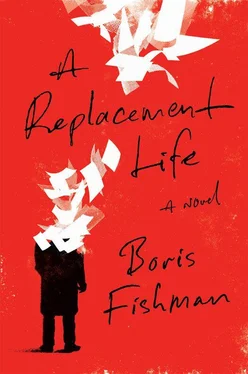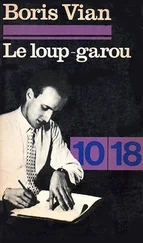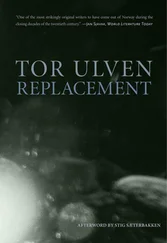“Me, too,” she said.
She took his hand and they tiptoed into the cold black water. Slava had been staring at the river from the edge of his neighborhood for years, but this was his first step inside the water that bordered New York on all sides. When you thought about it, it was as waterbound as a Venice, or an Amsterdam, but here, this natural boundary had been reduced to a sideshow. You did not think of New York as a water city. What if the water rose, as the scientists kept saying now and then. What would go first? What would be carried away, and what would rise in its place? The thought of a different city, a city he could have a hand in, made him excited and gave him the boldness to wade deeper into the impenetrable ocean.
MONDAY, AUGUST 28, 2006
On Monday, the Times carried a story about a lawsuit against the German government by a group calling itself Advocates for Historical Justice. The plaintiffs, represented by an Australian attorney with the surely invented name of Howard Settledecker, had “made an appeal to the German Holocaust restitution funds to revise eligibility requirements to include those on the Eastern Front who had never been incarcerated in a ghetto or a concentration camp but had suffered nevertheless as a result of the German invasion.”
Beau wore suspenders over a pink shirt. The sleeve creases could cut. His eyes gleamed with a weekend of rest, sport, and other diversions. He greeted everyone and slid his thumbs under his suspenders. “The fall issue this Friday,” he said. “We might have late-breaking up front. Gruber is still filing. But it has to be shuttered on Friday. Acceptable to everyone?” Everyone nodded.
“There’s a story in the Times today about Holocaust reparations,” Beau went on. “Anyone read it? You know how I feel about the Times beating us, so we might ignore it. But just in case, there’s a press conference this afternoon at the Museum of Jewish Heritage. Howard Settledecker! You’re in for a treat. Mr. Grayson, when did my profile run?”
“I’ll look it up, Mr. Reasons,” Mr. Grayson said. “Nineteen ninety-seven, I believe.”
“Who wants it?” Beau said. “I want two.”
A familiar hand rose, the cuff of the blazer riding down to the elbow.
“Peter,” Beau said. “Excellent. Who else?”
The cubicles produced no response. Slava’s mind was floating with Otto, trying to imagine the angles.
“How about a rematch?” Beau said. “Mr. Gelman, can we have the honor? Let’s see what our little clinic accomplished.”
Slava looked up, startled. He felt Arianna at his temple again. He couldn’t understand what she was trying to telegraph. Do it? Don’t do it?
“Mr. Gelman?” Beau said. “Should I plead for you to take an assignment from Century ?” The group tittered nervously.
Slava didn’t speak.
“I’ll take that as a yes,” Beau said.
“Want to just go downtown together?” Peter said. “Split a cab?”
They whooshed downstairs in the glass elevator. Outside, Peter surged toward the curb and stuck out his hand. “There’s a system,” he explained once they’d climbed into the taxi. “You have to find the biggest building on the street and get ahead of it. Most people don’t think of that. They just stand in front of their buildings and wait.”
“Doesn’t the building with the most people also have the most cabs emptying out?” Slava said.
Peter scratched the wisps sprouting from his chin and admitted that Slava had a point.
They continued in silence. They hadn’t spoken since the competition. They hadn’t spoken much before, either, but now their distance had an ill-feeling cast. At Thirty-Fourth, Peter turned to Slava. “Can we clear the air?” He extended a hand.
Slava nodded and took it. Despite his near translucence, Peter had a firm, dry clasp. “Thanks,” Peter said. “I’m glad.”
“Tell me what it takes,” Slava said.
Peter looked at him quizzically.
“They publish everything you give them.”
Peter threw his head back, flattered and exasperated. “About one out of ten things I give them.”
“What does it take?”
“What difference does it make?” Peter said. “You don’t like what I write, anyway.”
Slava, confronted with the truth, said nothing.
“There’s a style,” Peter said. “It’s not your style.”
“I want it to be my style,” Slava said.
“You don’t,” Peter said. “Otherwise, it would be.”
Despite the choking weather, the press conference was taking place outside. Slava didn’t understand why Settledecker was passing up the opportunity to be photographed inside, next to the cattle cars and shoe piles advertised by the banners lining the drive to the museum. Slava had skimmed the Times story before walking out with Peter: Australian Settledecker (he owned a quarter of some sparsely settled territory in the country’s hinterland), “the unapologetic mastermind of controversial publicity campaigns that have succeeded in compelling United Nations resolutions, the return of looted art, and university firings.” In resentment, Slava had declined to peruse Beau’s article.
On a broad gray dais, Settledecker swung his long arms and scratched his beard. He wore an ill-fitting three-piece suit. You could see his ankles when he gestured with special intensity.
“What’s with the suit?” Peter said. “He looks like a tailor from the shtetl.” He pronounced “shtetl” carefully, as if he had learned the word that morning in the Encyclopedia of Jewish History in the fact-checkers’ library.
Peter had instincts; he was right without knowing it. The vest, the striped shirt underneath it, the usually fastidious beard allowed to go unkempt: Settledecker was subtly channeling a poor Jew.
There were three rows of black folding chairs to the side of the dais, filled with pensioners holding on to reedy bouffants in the suffocating wind off the Hudson. By the cheap jackets shielding them from the clandestine ravages of the breeze, by the gold teeth sparkling in the strong sun, by the dazed faces — you knew. Nashi . Russians all.
Slava made the next observation in his notepad with astonishment: Underneath the jackets, they wore prison uniforms. Striped prison uniforms. They could have been from a Halloween store. Numbers had been embroidered on the chests, yellow stars taped beneath them. Some of the seniors, worried about the lost impact of stars concealed by outerwear, had un-Velcroed the six-pointed stars and were trying to affix them to their overcoats.
They snacked: cylinders of cookies, bread-and-cheese sandwiches, yogurt. Behind the seating, a long table covered in white tablecloths held bowls of sandwiches and bottles of water for the postcoital repast. The seated periodically turned to make sure no one was making unauthorized advances on the food. On the rim of the meadow, penny-colored seniors visiting from Florida paused to take in their less well-preserved contemporaries on camcorder.
“Why would they put all these old people in the heat?” Slava said to Peter.
“You think they could fit this arrangement inside?” Peter said, his pen moving fluidly down his notepad. “I’m going to walk around.” He nodded toward the chairs.
Two young women were trying to attach a large banner that said “Remembrance” to a fence behind the dais. It kept kicking up in the wind. Settledecker yelled at them from the platform, the coils of his hair leaping and crouching. Eventually, he gave up and began to choreograph a camera crew unfolding its mantises. He shouted for an assistant to weigh down the napkin towers on the serving tables.
Читать дальше











